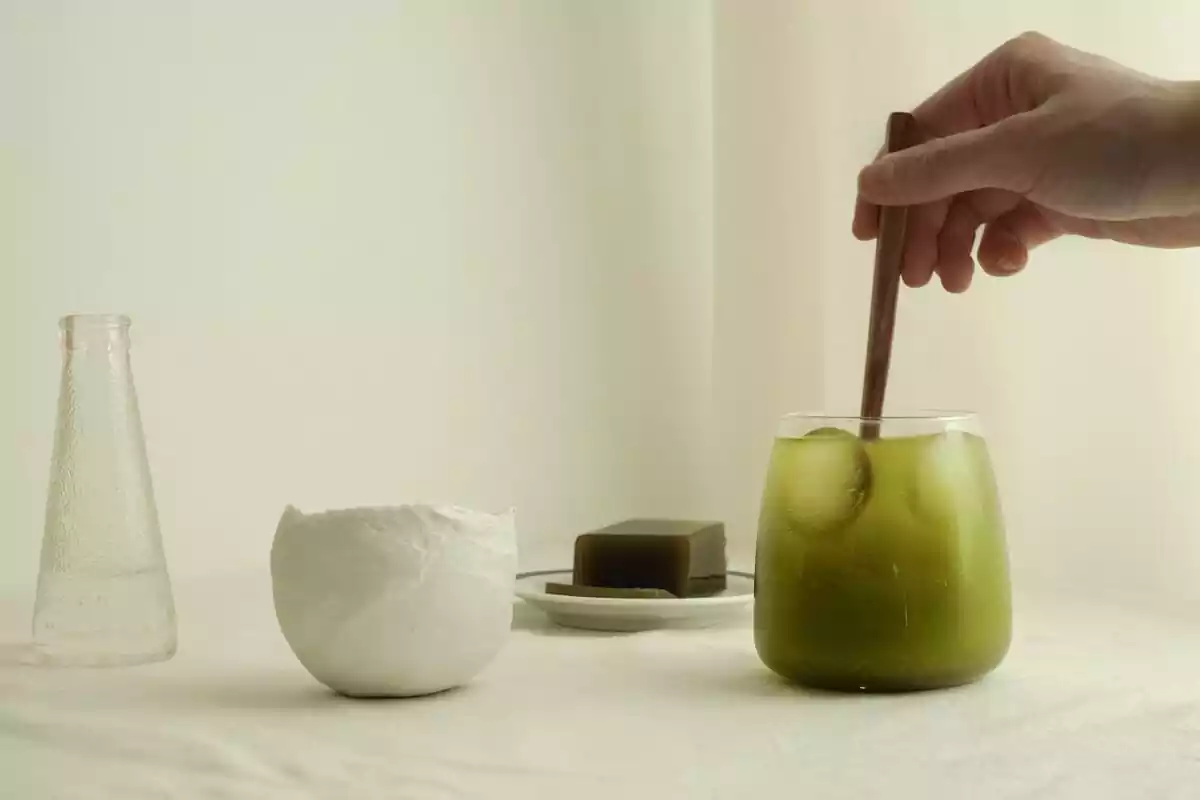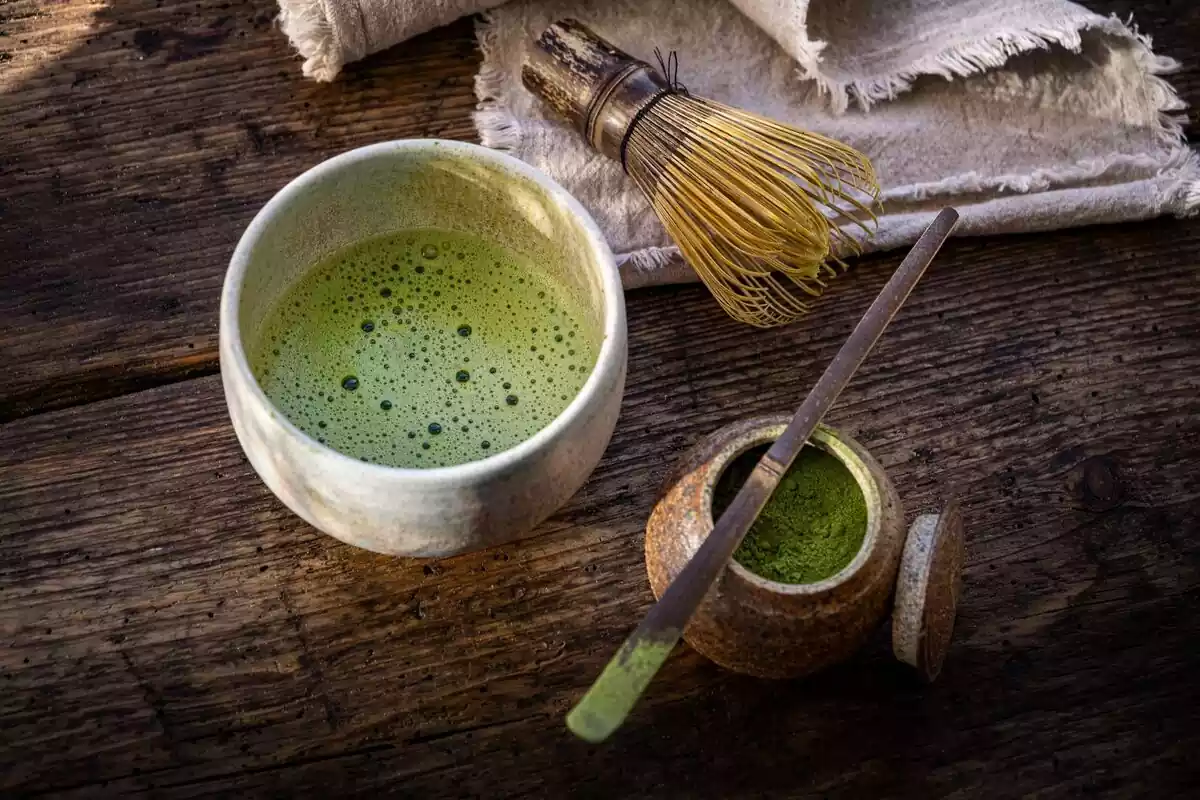This tea is distinguished by its versatility and its possible health benefits, although its taste has as many admirers as detractors. In this article, we will find out what matcha tea is, what benefits it has and how this popular green tea is prepared.
What is matcha tea?
Matcha tea, like traditional green tea, comes from the Camellia sinensis plant. However, both differ in their cultivation and nutritional profile.
Unlike green tea, from which we consume the dried leaves of the plant, matcha is a finely ground powder of specially cultivated and processed tea leaves. The plants are grown in the shade for approximately three weeks before harvest. During this process, the tea plant produces more theanine and caffeine.
Matcha powder is also consumed differently from the traditional green tea, as it is usually dissolved in liquid, usually milk or water.
This tea of Asian origin, specifically from China, is the main protagonist of the traditional Japanese tea ceremonies. This well-known ritual focuses on the preparation, service, and consumption of hot matcha tea. But this ritual is not restricted only to these steps but represents a whole meditative spiritual style.
Another distinctive characteristic of this tea is that different grades are depending on the quality of it and each of them is used for different purposes. While the highest grade, the highest quality one called ceremonial-grade matcha, is only used in tea ceremonies, the lowest quality one is known as culinary grade tea, and it is used in recipes and food preparations.
Matcha tea benefits
As mentioned previously, matcha tea has its own nutritional profile, a different one from green tea. Tea in powder has the nutrients of all the leaf, which means it has a more considerable amount of caffeine and antioxidants.
On the other hand, some studies on matcha and its components have proven a variety of benefits that suggest properties related to the protection of liver and heart health and the potentiation of weight loss. But there are many more.
In the following lines, we revise 6 matcha tea health benefits backed up by science.
1. It is rich in antioxidants
This type of green tea powder is rich in catechins, some vegetable compounds that have natural antioxidant properties. These antioxidants help us stabilize the harmful free radicals, some atoms that harm cells and cause premature aging of the tissues.
One of the advantages of matcha tea is that, when you put the powder into hot water or milk, it still has all its nutrients. This means that it will tend to have more catechins and antioxidants than merely soaking the leaves in water, just like you do with green tea.
Including this tea in our diet can increase the intake of antioxidants, which can favor the prevention of cell damage, that could lead to the appearance of some kind of chronic diseases.
2. It enhances brain function
Research is currently underway that could show how several of the matcha's components can help improve brain function.
Some of this research suggests that this powdered tea may improve attention, reaction time, and memory. In addition, it improves overall brain function in older people.
Also, matcha tea contains more concentrated amounts of caffeine than the dried leaf variety. Other studies suggest that this caffeine, consumed in moderation, improves brain function, resulting in faster reaction time, greater attention and better memory.
Finally, as far as brain function is concerned, this tea also contains a compound known as L-theanine, which is suggested to increase brain alpha waves, which may help induce relaxation and decrease stress levels.
3. It protects the heart health
Some studies hypothesize that, just like green tea, the regular consumption of matcha can help to protect against heart diseases.
It has been proven that this type of tea can help reduce total levels of "bad" and LDL cholesterol, as well as triglycerides. In the same way, it can also help prevent the oxidation of LDL cholesterol, which can protect against heart diseases.
To sum up, when it is combined with a balanced diet and a healthy lifestyle, matcha tea can help to keep the heart healthy and protect it against diseases.

4. It is good for the liver
The liver is an essential organ in toxin elimination, drug metabolism, and nutrient processing.
Some studies in animal models suggest that matcha may help protect liver health, specifically by helping to prevent damage and significantly reducing liver enzyme levels.
However, it is necessary to remember that much research is still needed to corroborate these data.
5. It enhances weight loss
Both matcha tea and green tea are known because of their ability to enhance weight loss. They help speed up metabolism, increasing energy expenditure and fat burning.
6. Studies about cancer prevention
Although these are test-tube or animal models studies, there is research trying to discover how the catecholamines present in this tea, specifically one of them known as epigallocatechin-3-gallate (EGCG), favor the elimination of cancer cells.
However, we must bear in mind that these are studies that have not been tested on humans and that examine specific compounds of matcha, so much more research is still needed.
How to make matcha tea
Without taking into account the traditional preparations and rituals, matcha tea is a surprisingly easy drink to prepare.
On the one hand, we can prepare it filtering 1 or 2 teaspoons (2-4 grams) of powder in a cup adding hot water. We can increase or reduce the quantity of tea depending on the intensity of the taste we want.
To mix it, we need a special whisk made of bamboo that we will find in most specialized or herbalist's shops.
Finally, we can also prepare it with milk in a preparation known as matcha latte or add it to fruit juices and smoothies.
References
Weiss, D. J. & Anderton, C. R. (2003) Determination of catechins in matcha green tea by micellar electrokinetic chromatography. Journal of Chromatography, 5;1011(1-2):173-80.
Yin, X., Yang, J., Li, T., Song, L., Han, T., Yang, M., Liao, H., He, J. & Zhong, X. (2015) The effect of green tea intake on risk of liver disease: a meta analysis. International Journal of Clinical and Experimental Medicine, 8(6): 8339–8346.
